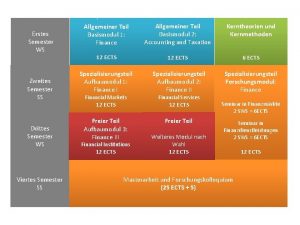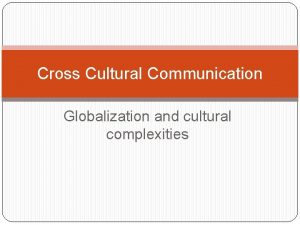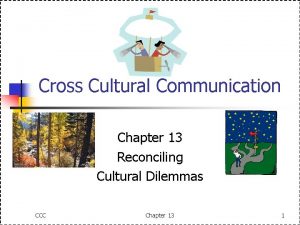Cross Cultural Psychology Department of Psychology PG Semester









- Slides: 9

Cross Cultural Psychology Department of Psychology PG Semester IV Dr. Aparna Pathak

Cross-cultural psychology is concerned with the systematic study of behavior and experience as it occurs in different cultures, is influenced by culture, or results in changes in existing cultures (Triandis. 1980. p. 1). This broad definition includes both contemporary cross-cultural psychology and cultural psychology. Contemporary cross-cultural psychology examines psychological phenomena in many cultures. It measures psychological constructs equivalently in different cultures. An ideal study would use an instrument that has equivalent meaning in cultures sampled from all the cultural regions of the world. One of the purposes of cross-cultural psychology is to establish the generality of psychological findings, and thus a broad sampling of cultures is appropriate. The theoretical framework is universalistic, and assumes the psychic unity of humankind.





Cultural Transmission cultural transmission (sometimes referred to as 'cultural learning'), is the process of learning new information through socialization and engagement with those around you. The cultural transmission of knowledge is a broad concept, and it refers to knowledge that is gained through non-biological means. Different socialsystems or cultures weigh various possible transmitters or models in the transmission process differentially: mother, father, teacher, and peers differ in their importance for the cultural transmission of certain behaviors or traits. Homogeneity of transmitters with reference to the transmitted contents ensures the greatest transmission effects.

The first considerations in the process of transmission lead us to postulate that it is a two-stage process: The first stage is awareness of the information to be transmitted, and the second is acceptance of it. The two stages are only distinguishable when there is a choice to accept or not to accept.

Thankyou
 Cross cultural adaptability inventory
Cross cultural adaptability inventory Cross cultural consumer behaviour
Cross cultural consumer behaviour Cross cultural differences and similarities
Cross cultural differences and similarities Five habits of cross cultural lawyering
Five habits of cross cultural lawyering First steps in english linguistics chapter 8
First steps in english linguistics chapter 8 Cross cultural consumer behavior
Cross cultural consumer behavior Cross cultural communication and negotiation
Cross cultural communication and negotiation Cross cultural negotiation and decision making
Cross cultural negotiation and decision making Chapter 22 reaching out cross-cultural interactions
Chapter 22 reaching out cross-cultural interactions Youngyun kim
Youngyun kim

















